Struck

“I had been my whole life a bell, and never knew it until at that moment I was lifted and struck."

“I had been my whole life a bell, and never knew it until at that moment I was lifted and struck."
You Suspect This Could Be Yours
by Rumi, translated by Daniel Liebert
you suspect this could be yours
with a little contrivance
only death to contrivance
will avail you
something good or bad
always comes out of you
it is agony to be still;
the spool turns
when mind pulls the thread
let the water settle;
you will see moon and stars
mirrored in your being
when the kettle boils
fire is revealed
when the millstone turns
the river shows its power
put the lid on the kettle
and be filled
with the boiling of love.
“When you ask people about love, they tell you about heartbreak. When you ask people about belonging, they’ll tell you their most excruciating experiences of being excluded. And when you ask people about connection, the stories they told me were about disconnection.”
~ Brené Brown, from “The Power of Vulnerability” TED Talks, June 2010
Posted by
Daron
at
12:41 PM
![]()
Labels: addiction, belonging, Brené Brown, connection, discomfort, equanimity, numbing, parenting, perfectionism, TED, uncertainty, vulnerability
Dr. Richard Fratianne, from “Art and Medicine,” produced by Kerrie Hillman, Studio 360, December 10, 2010:
The problem is music therapy is not compensated by either governmental programs or private insurance policies, because there just isn't very much science in music therapy — yet. And so, I thought that it might be interesting to see if we could prove the value of music therapy in the burn center where pain and anxiety are really very, very high.
 A burn injury is so profound that it effects every part of the person. It's not only physical and emotional, but it's an intellectual challenge and there's a spiritual threat because patients don't recognize who they are anymore. They don't feel the same. They don't look the same. Oftentimes they feel ashamed of how they look and they're so afraid. We chose burn patients because the pain is so severe and the anxiety is so high that we thought if we can prove that music therapy can actually have a positive effect in these patients, then we can rest assured that it's going to work in every patient.
A burn injury is so profound that it effects every part of the person. It's not only physical and emotional, but it's an intellectual challenge and there's a spiritual threat because patients don't recognize who they are anymore. They don't feel the same. They don't look the same. Oftentimes they feel ashamed of how they look and they're so afraid. We chose burn patients because the pain is so severe and the anxiety is so high that we thought if we can prove that music therapy can actually have a positive effect in these patients, then we can rest assured that it's going to work in every patient.
Obviously, we can give pain medication, we can give sedatives and tranquilizers, but if it's a really painful dressing change there's no way you can relieve all of the pain except under anesthesia and you can't anesthetize a patient two or three times a day. The body won't tolerate it.
Music requires and integration of many parts of the brain. There's the motor part that's the physical response to playing or tapping to the rhythm of music. Then there's the limbic system, the emotional response to hearing music that brings forth feelings and thoughts and ideas. But also there's rhythm, there's tempo, there's melody — all of these things have to be integrated at the same time to appreciate music. It's amazing how the brain can do this.
The reason we need a professional music therapist to intervene in these painful procedures is that by their training they're able to capture the patient's attention. We call that entrainment. It is actively involving the patient in the musical experience. Because when their mind is diverted to participating in the therapy, they cannot think about the pain.
The earlier research just asked the patient before and after a musical experience, “Do you feel better yet?” That doesn’t really prove anything. It’s only when you’re dealing with patients like we’re dealing with in the burn unit that you can clearly identify changes in their response with music therapy. And we have done that.
One of our latest studies is utilizing the measurements of a stress hormone which is one of the products of the adrenal gland in response to stress. We know when patients are highly stressed these levels go up. And we’re measuring to see whether music therapy can actually depress those levels of the hormone. And our initial studies have shown that.
What we’re doing is new. We know that. And that’s why it’s exciting, because it is new. But the music can have a calming effect on people. How it works is still being discovered.
Posted by
Daron
at
8:41 AM
![]()
Labels: anxiety, attention, medicine, music, pain, paying attention, stress, Studio 360
 "To make art is to sing with the human voice. To do this you must first learn that the only voice you need is the voice you already have. Art work is ordinary work, but it takes courage to embrace that work, and wisdom to mediate the interplay of art and fear. Sometimes to see your work's rightful place you have to walk to the edge of the precipice and search the deep chasms. You have to see that the universe is not formless and dark throughout, but awaits simply the revealing light of your own mind. Your art does not arrive miraculously from the darkness, but is made uneventfully in the light.
"To make art is to sing with the human voice. To do this you must first learn that the only voice you need is the voice you already have. Art work is ordinary work, but it takes courage to embrace that work, and wisdom to mediate the interplay of art and fear. Sometimes to see your work's rightful place you have to walk to the edge of the precipice and search the deep chasms. You have to see that the universe is not formless and dark throughout, but awaits simply the revealing light of your own mind. Your art does not arrive miraculously from the darkness, but is made uneventfully in the light.
What veteran artists know about each other is that they have engaged the issues that matter to them. What veteran artists share in common is that they have learned how to get on with their work. Simply put, artists learn how to proceed, or they don't. The individual recipe any artist finds for proceeding belongs to that artist alone—it's non-transferable and of little use to others."
~ David Bayles and Ted Orland, from Art & Fear: Observations On the Perils (and Rewards) of Artmaking
[Thanks, Whiskey River!]
 "I never, in any city I've ever been in, never remember the names of streets. The longest place I ever lived in was for five years and I didn't know the name of the next street over. Why bother! I think there's such enjoyment in just getting lost in a city. Having no idea where you are, how you're gonna get out of it. Getting to be the middle of the night, you're still lost, walking around. That's the best way to discover a city. That's how you're born into life. You got no freaking idea which way's up or down."
"I never, in any city I've ever been in, never remember the names of streets. The longest place I ever lived in was for five years and I didn't know the name of the next street over. Why bother! I think there's such enjoyment in just getting lost in a city. Having no idea where you are, how you're gonna get out of it. Getting to be the middle of the night, you're still lost, walking around. That's the best way to discover a city. That's how you're born into life. You got no freaking idea which way's up or down."
~ Christian Bale, in an interview with John H. Richardson for Esquire
See also: The Business from KCRW (December 13, 2010)
Everybody Here is a Cloud
by Cloud Cult
And everybody here is a cloud
and everybody here will evaporate
you came up from the ground
from a million little pieces
have you found where your place is
you've been spending your time
thinking about why you think so much
if there was ever a time
now would be the time to see
your time here is limited
and everybody here is a crowd
we all walk around with a million faces
somebody turn the lights out
there's so much more to see
in our darkest places
everybody here is waiting for the next creation
they say go, go, go, go
* * * * *
Cloud Cult on World Cafe (12/15/2010)
W.S. Merwin from “The Garden & the Sword,” an interview with Joel Whitney, Tricycle Magazine, Winter 2010:
I don’t think we have imagination apart from the environment. And I don’t think we have an existence apart from the environment either. And if the imagination isn’t about our existence, I don’t know what it’s about. It’s not about making money, that’s for sure.
…If you’re looking for neat formulaic answers in Dogen, you don’t find them. You don’t find them in Keizan, either. You have to come at them from a different part of your own mind. That’s the part of Zen practice that’s attractive to me. But it’s not unique to Zen. It’s there in Taoism. It probably was there in parts of the practice that became Greek Orthodoxy, that came out of the desert. The origins of all of those things are extremely ancient; they’re older than what we think of as the beginnings of Buddhism. The origin of Taoism may be completely on its own, but all of them go back to shamanism. And we don’t know know the history of shamanism; it’s all speculation. They link in my mind to things which are incredibly ancient.
…the link between the imagination—which to me is the great pinnacle of humanity, the imagination that makes the arts and makes compassion—is ancient in our species and goes way back. And it’s never been separate. And when you get any aspect of the culture that tries to separate it, it’s destructive and suicidal.
Take them away, names like Buddhism. I’m impatient with them. There’s something beyond all that, beneath all that that they all share, that they all come from. They are branches from a single root. And that’s what one has to pay attention to.
| Song Dynasty painting in the Litang style illustrating the theme "Confucianism, Taoism and Buddhism are one." Depicts Taoist Lu Xiujing (left), official Tao Hongjing (right) and Buddhist monk Huiyuan (center, founder of Pure Land) by the Tiger stream. The stream borders a zone infested by tigers that they just crossed without fear, engrossed as they were in their discussion. Realizing what they just did, they laugh together, hence the name of the picture,Three laughing men by the Tiger stream. |
Posted by
Daron
at
12:57 PM
![]()
Labels: art, Buddhism, compassion, imagination, poets, religion, W. S. Merwin, Zen
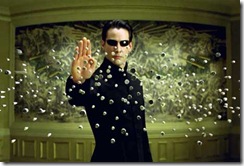 “Hackerdom rewards spontaneity, curiosity and ingenuity. Science rewards rigor and forging solid bedrock to stand on — which means a lot of carefully dotting i’s and crossing t’s. Although scientific questions are harder, more abstract and tend to have less immediate influence in the world, the questions are deeper and the answers so uplifting and transcendently beautiful that contact with them is a genuine spiritual experience.”
“Hackerdom rewards spontaneity, curiosity and ingenuity. Science rewards rigor and forging solid bedrock to stand on — which means a lot of carefully dotting i’s and crossing t’s. Although scientific questions are harder, more abstract and tend to have less immediate influence in the world, the questions are deeper and the answers so uplifting and transcendently beautiful that contact with them is a genuine spiritual experience.”
~ Virgil Griffith, from “Looking for the Real Mark Zuckerberg,” by Virginia Heffernan, New York Times Sunday Magazine, December 12, 2010
Posted by
Daron
at
12:20 PM
![]()
Labels: beauty, science, technology, Virgil Griffith, Virginia Heffernan
"In our modern world that's inundated with media and information, I think the crossword puzzle is a return to asking something of you rather than bombarding you with new information."
~ David Kwong, whose unique performance draws on his talents as a magician and as a crossword puzzle creator.
Excerpt from “Making Joy Our Default Setting,” a Buddhist Geeks conversation with James Baraz (October 18, 2010):
 “If you’re just thinking you’re supposed to be skipping through a meadow in slow motion like a commercial, you’re missing out on what life is about. Truly happy people are not happy all the time. They’re engaged, they’re here for everything through the ups and downs. If you’re going through loss or you’re going through a hard time or you’re outraged about the state of the world, then you’re human. If you don’t go through those things, then you’re probably living in incredible denial…
“If you’re just thinking you’re supposed to be skipping through a meadow in slow motion like a commercial, you’re missing out on what life is about. Truly happy people are not happy all the time. They’re engaged, they’re here for everything through the ups and downs. If you’re going through loss or you’re going through a hard time or you’re outraged about the state of the world, then you’re human. If you don’t go through those things, then you’re probably living in incredible denial…
So, when you’re feeling anger or you’re feeling loss, suppose somebody close to you is sick or dies or you get some scary news or a change of circumstance, to not be afraid to go into them. This is the key, this where you can feel the suffering and hold it with a wise awareness. Where you process it directly and say, ‘Oh, this is what fear is like. This is what anger is like. This is what sadness is like.’ But that which is aware of the sadness is not sad. That which is aware of the fear is not afraid. The awareness can hold it all. So, it’s a matter of really understanding how to work with our sorrows and our fears that really is a path to joy.”
Excerpts from Roundtable: Meeting of the Minds, Tricycle Magazine, Spring 2005:
Richard Davidson: Our initial work certainly indicates that meditation changes brain function. One of our hopes now is that a broader range of scientists will be inspired to examine the potential impact of contemplative practice on different behavioral domains. One of our goals is to launch studies that look at the impact of meditation on attention and the brain systems that support it.
We’ve been talking with experts who do experiments in which, for example, a person is required to focus on a specific object and ignore distractions. One question is whether training in meditation facilitates one’s capacity to do this, and, if it does, which parts of the brain are being affected.
 There are well-developed procedures in cognitive psychology for exploring such questions. The classic one is the Stroop Test. In one version of this test, the word “green” might be printed on a card in red, and the subject’s task would be to name the color in which the word was printed (red), ignoring the meaning of the word (green). Classically, people are slower in responding when the color of a word is inconsistent with the name of the word than when the two are the same: when the word “green” is printed in green, people are able to say “green” faster than when they’re looking at the word “green” printed in red. What this requires is that we inhibit our automatic response and focus our attention on the instructions given by the experimenter.
There are well-developed procedures in cognitive psychology for exploring such questions. The classic one is the Stroop Test. In one version of this test, the word “green” might be printed on a card in red, and the subject’s task would be to name the color in which the word was printed (red), ignoring the meaning of the word (green). Classically, people are slower in responding when the color of a word is inconsistent with the name of the word than when the two are the same: when the word “green” is printed in green, people are able to say “green” faster than when they’re looking at the word “green” printed in red. What this requires is that we inhibit our automatic response and focus our attention on the instructions given by the experimenter.
B. Alan Wallace: Shamatha [a meditative practice of calming the mind] is specifically aimed at controlling attention. When the word pops up, if you’re able to control your attention, you can say to yourself, “I’m not going to see the whole word. I’m going to focus on the middle of the word and ask only one question: What is its color?” If you’re looking at the whole word, the meaning of the word will compete for your attention, and you’ll be slowed down.
Attention training has broad applications. It would be helpful in the fields of education, mental health, and athletics as well as increasing individual creativity and problem-solving skills. And attention practice is crucial for cultivating the profound virtues of the heart and mind—lovingkindness, compassion, bodhicitta [awakened mind], and the realization of emptiness.
If, when anger or another afflictive emotion arises, you can say to yourself, “Never mind the object of my anger and the context; isn’t this interesting?” and investigate your own emotional state instead of merely reacting, you can also cultivate greater emotional balance and mental health.”
[Thanks, Jeanne!]
Posted by
Daron
at
9:01 PM
![]()
Labels: Alan Wallace, attention, color, metta, neuroscience, perception, Richard Davidson
"We need not think of rebirth only in a future life. We are in actual fact reborn every moment with new thoughts and feelings, and we bring with us the karma that we made in past moments. If we were angry a moment ago, we are not going to feel good immediately. If we were loving a minute ago, we would be feeling fine now. Thus we live from moment to moment with the results of our karma.
 Every morning, particularly, can be seen as a rebirth. The day is young, we are full of energy, and have a whole day ahead of us. Every moment we get older and are tired enough in the evening to fall asleep and die a small death. All we can do then is toss and turn in bed, and our mind is dreamy and foggy. Every day can be regarded as a whole lifespan, since we can only live one day at a time; the past is gone and the future may or may not come; only this rebirth, this day, this moment, is important."
Every morning, particularly, can be seen as a rebirth. The day is young, we are full of energy, and have a whole day ahead of us. Every moment we get older and are tired enough in the evening to fall asleep and die a small death. All we can do then is toss and turn in bed, and our mind is dreamy and foggy. Every day can be regarded as a whole lifespan, since we can only live one day at a time; the past is gone and the future may or may not come; only this rebirth, this day, this moment, is important."
“There is a fundamental reason why we look at the sky with wonder and longing—for the same reason that we stand, hour after hour, gazing at the distant swell of the open ocean.
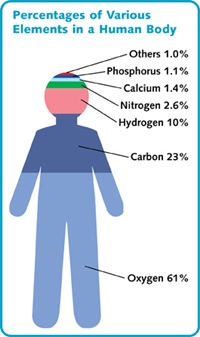 94 percent of the human body is made up of the key elements oxygen, carbon, and hydrogen. |
There is something like an ancient wisdom, encoded and tucked away in our DNA, that knows its point of origin as surely as a salmonid knows its creek.
Intellectually, we may not want to return there, but the genes know, and long for their origins—their home in the salty depths.
But if the seas are our immediate source, the penultimate source is certainly the heavens…
The spectacular truth is—and this is something that your DNA has known all along—the very atoms of your body—the iron, calcium, phosphorus, carbon, nitrogen, oxygen, and on and on—were initially forged in long-dead stars.
This is why, when you stand outside under a moonless, country sky, you feel some ineffable tugging at your innards. We are star stuff. Keep looking up.”
Posted by
Daron
at
11:10 AM
![]()
Labels: Albert Einstein, creativity, history, inventors, Maira Kalman, Nikola Tesla
“Lessons from General Grant,” by Francis Wilkinson, The Week, November 26, 2010:
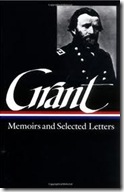 I'm a tragically slow reader, so I choose my books carefully. Lately, I've been reading the memoirs of U.S. Grant, albeit at a tortoise pace that makes my typical slow motion look like an Evelyn Wood demo. I've kept the book bedside for a couple years now, and still Appomattox is nowhere in sight. I move through chapters like heavy artillery through mud.
I'm a tragically slow reader, so I choose my books carefully. Lately, I've been reading the memoirs of U.S. Grant, albeit at a tortoise pace that makes my typical slow motion look like an Evelyn Wood demo. I've kept the book bedside for a couple years now, and still Appomattox is nowhere in sight. I move through chapters like heavy artillery through mud.
Yet the pace suits me — and the material. The war was a long, hard slog. And Grant's reflections have such resonance that I keep putting the book down to listen to the echoes. The fight against Mexico in 1846, Grant laments, was a "political" war waged on a false premise. Has a contemporary ring, doesn't it? The general who presided over the greatest destruction of American life in history — more than 600,000 soldiers on both sides died — also surprises with compassion. Contemptuous of slavery and committed to crushing the rebellion, Grant nonetheless has an ample soft spot for the enemy, taking risks to protect his foes' dignity. When Grant is ordered to handle rebels "without gloves" — including evicting Southern civilians from their homes and arresting them — he simply ignores the command. In fact, he fails to make a single arrest, having "deemed it better that a few guilty men should escape than that a great many innocent ones should suffer." It’s hard to resist projecting this thoughtful, anguished titan — a civil libertarian up to his epaulets in carnage — into the era of Guantánamo and Abu Ghraib. Grant didn't shrink from violence, but he didn't surrender principle, either. He did his duty, and he won. I peeked at the ending.
This Coldplay video was directed by Mat Whitecross and filmed in London on Thursday November 25th, 2010.
Excerpt from “Living as a River,” a Buddhist Geeks conversation with Bodhipaksa (October 11, 2010):
 “The brain has a limited capacity for bandwidth. Our short-term memory, for example, can only usually hold about 5-7 things. There’s not really that many things that we can pay attention to at one time. So, what happens when you’re meditating and just following your breath, is very often that a lot of thoughts are coming up and you start paying attention to those thoughts. And I found that, if you, as it were, choke the bandwidth of your mind by just paying a lot of attention to a lot of different stimuli at the same time, then you enter a state of a kind of open, expansive awareness, where there’s basically no room for thinking anymore. You’ve taken up all of your bandwidth. It’s a bit like there’s a bandwidth hog using your wireless internet connection, and everything’s going really slowly. That’s normally a bad thing, but here what we’re talking about going slowly is the discursive thinking that’s connected with stress and anxiety and irritability and wanting things. There’s no room for that anymore, so all we do is just notice our experience.”
“The brain has a limited capacity for bandwidth. Our short-term memory, for example, can only usually hold about 5-7 things. There’s not really that many things that we can pay attention to at one time. So, what happens when you’re meditating and just following your breath, is very often that a lot of thoughts are coming up and you start paying attention to those thoughts. And I found that, if you, as it were, choke the bandwidth of your mind by just paying a lot of attention to a lot of different stimuli at the same time, then you enter a state of a kind of open, expansive awareness, where there’s basically no room for thinking anymore. You’ve taken up all of your bandwidth. It’s a bit like there’s a bandwidth hog using your wireless internet connection, and everything’s going really slowly. That’s normally a bad thing, but here what we’re talking about going slowly is the discursive thinking that’s connected with stress and anxiety and irritability and wanting things. There’s no room for that anymore, so all we do is just notice our experience.”
![The History of England, From The Invasion of Julius Cæsar to the Revolution in 1688 by David Hume [Eight Volumes] The History of England, From The Invasion of Julius Cæsar to the Revolution in 1688 by David Hume [Eight Volumes]](http://lh6.ggpht.com/_khqAOpZqHEI/TPeanSfZOHI/AAAAAAAAENo/UJQjBt-aiN8/humes-england%5B6%5D.jpg?imgmax=800) “I have, in my place, books about English history. I like the bloodiness of it. I have one set of eight volumes. I read only the first volume, and of that only the first chapter, in which each time I see something else. But really, I am interested only in reading Volume Zero, which has not been written... History could not have started in the places they speak of. History preceded this; it just is not recorded. The beauty of architecture is that it deals with the recessions of the mind, from which comes that which is not yet said and not yet made.
“I have, in my place, books about English history. I like the bloodiness of it. I have one set of eight volumes. I read only the first volume, and of that only the first chapter, in which each time I see something else. But really, I am interested only in reading Volume Zero, which has not been written... History could not have started in the places they speak of. History preceded this; it just is not recorded. The beauty of architecture is that it deals with the recessions of the mind, from which comes that which is not yet said and not yet made.
Of all things, I honor beginnings. I believe, though, that what was has always been, and what is has always been, and what will be has always been. I do not think the circumstantial play from year to year, from era to era, has anything to do with what is available to you. The person of old had the same brilliance of mind that we assume we have now. But that which made a thing become manifest for the first time is our great moment of creative happening.”
~ Louis Kahn, from Louis I. Kahn: Writings, Lectures, Interviews
Excerpt from “Living in Buddha Standard Time,” a Buddhist Geeks conversation with Lama Surya Das (October 4, 2010):
Most people have had an experience of time slowing down, maybe like in a traffic accident or while they’re falling from a height, or tumbling over beneath the waves and drowning or something. Or, if you’re in pain, a minute seems like an hour. What’s the saying? The watched pot never seems to boil. You know, while you’re waiting for the pot to boil, if you go away it boils right away. You like have to hurry back it seems. But if you sit there, watching it, it seems never to boil.
Time is so elastic, and it’s not just that it’s speeded up in this era; it could also be slowed down if we’re more aware. Maybe you’ve experienced that on some drug or something. Maybe you’ve experienced it in a dream or a vision. Time can also be very slow motion. The outer slowing down of time with slow motion film and all is just an image of how this feels internally, when you’re more aware. By sharpening you’re awareness, processing the frames of awareness like a movie frame. Every step seems to be slower, you can be very aware of lifting and moving your foot forward and shifting the weight in your abdomen and putting down the other foot and stepping on it—without walking slower, by shifting the mind, by more sharp and quick awareness. Not thinking faster, but with quicker awareness.
This is attention training. This is awareness training. This is part of samadhi or focused awareness. We can train ourselves in this way to be aware of more mind moments within one second or one minute. To be aware of the space between thoughts, not just the thoughts that we’re caught in, and so on. And to slow down a little and to be more present so we can choose how and if to respond to stimuli, not just blindly reacting. The secret of mindful anger management is creating some space between the outer stimulus and your reaction, so you can choose how and when to respond.
I think that time is very elastic, and…what did Einstein say? Time slows down so much when you’re waiting to see if you can take that first kiss from a girl. That’s Albert Einstein by the way, I’m not making it up. So he doesn’t just talk about e=mc2 and how at the speed of light all mass is fused and so on, time and space continuum and different dimensions. He was actually saying that when you are keenly present and aware and involved wholly in something, when you’re on the edge of your mental seat, time seems to slow down, like waiting to see if you can kiss that girl, when you’re young.
Posted by
Daron
at
8:28 AM
![]()
Labels: Albert Einstein, Lama Surya Das, paying attention, perception, present, time
Blank
by George Bilgere, from American Life in Poetry
When I came to my mother’s house
the day after she had died
it was already a museum of her
unfinished gestures. The mysteries
from the public library, due
in two weeks. The half-eaten square
of lasagna in the fridge.
The half-burned wreckage
of her last cigarette,
and one red swallow
of wine in a lipsticked
glass beside her chair.
Finally, a blue Bic
on a couple of downs
and acrosses left blank
in the Sunday crossword,
which actually had the audacity
to look a little smug
at having, for once, won.


What Is There Beyond Knowing
by Mary Oliver
What is there beyond knowing that keeps
calling to me? I can’t
turn in any direction
but it’s there. I don’t mean
the leaves’ grip and shine or even the thrush’s
silk song, but the far-off
fires, for example,
of the stars, heaven’s slowly turning
theater of light, or the wind
playful with its breath;
or time that’s always rushing forward,
or standing still
in the same—what shall I say—
moment.
What I know
I could put into a pack
as if it were bread and cheese, and carry it
on one shoulder,
important and honorable, but so small!
While everything else continues, unexplained
and unexplainable. How wonderful it is
to follow a thought quietly
to its logical end.
I have done this a few times.
But mostly I just stand in the dark field,
in the middle of the world, breathing
in and out. Life so far doesn’t have any other name
but breath and light, wind and rain.
If there’s a temple, I haven’t found it yet.
I simply go on drifting, in the heaven of the grass and the weeds.
Posted by
Daron
at
8:12 AM
![]()
Labels: Mary Oliver, nature, paying attention, poetry, thinking, uncertainty, yearning
Tara Brach, from Presence and Aliveness (Part 1), January 20, 2010 (download audio):
Our children do, more than ever, grow up in a virtual reality: video games and TV and computers and texting. Leaving the body’s very reinforced by the culture.
In spiritual-religious communities there’s a mistrust of the body. Especially where there’s a real imprint of the kind of shadow-masculine of controlling the body and not getting seduced by pleasure. You see this in the monastic communities.

And of course we know, in this culture, there’s a mistrust of the body with pain, that pain is wrong, it’s bad, it’s to be controlled. And again, it’s totally wise and compassionate to use medication when appropriate, and we so overdo it. We’re so afraid of pain. We think that aging and death are kind of an embarrassment, an insult in some way. We anesthetize births and way over-interfere with dying.
So it’s a split. We get split from our bodies in this culture and it gets very much amplified with emotional wounding. If you really consider that the pain of our emotion lives in our bodies, when that emotional feels like too much, especially when we’re traumatized early, we have to leave. We have no other way to handle it. Emotional trauma makes us leave our bodies. The more emotional wounding there’s been, the more we’ve left our bodies. It’s pretty directly correlated.
So we push away the immediate experience of the pain in our body because we’re designed to try to anesthetize that much pain. The point, again, is not that we should avoid what comforts. It’s not even that we should stick with something that’s overwhelming.
 The truth is our lives get very organized around avoiding unease and unpleasantness. It becomes important to recognize our flinch responses, our intolerance to physical discomfort or to difficult emotional weather. Because the habit is so quickly—without even be conscious of it—to leave our body and go into what I sometimes think of as the mental control tower, where we try to work things and maneuver things to feel better. We don’t stay. One of the best phrases I know, in terms of describing meditation, is learning to stay. Not in a way that’s uncompassionate. Not when it’s too much. But gradually getting the knack of noticing we’ve left, noticing we’re off in thoughts, and reconnecting with this aliveness.
The truth is our lives get very organized around avoiding unease and unpleasantness. It becomes important to recognize our flinch responses, our intolerance to physical discomfort or to difficult emotional weather. Because the habit is so quickly—without even be conscious of it—to leave our body and go into what I sometimes think of as the mental control tower, where we try to work things and maneuver things to feel better. We don’t stay. One of the best phrases I know, in terms of describing meditation, is learning to stay. Not in a way that’s uncompassionate. Not when it’s too much. But gradually getting the knack of noticing we’ve left, noticing we’re off in thoughts, and reconnecting with this aliveness.
Posted by
Daron
at
9:33 AM
![]()
Labels: aging, body, death, discomfort, feelings, mind, mind-body, mindfulness, pain, resistance, Tara Brach
Kevin Kelly, Senior Maverick at Wired magazine and author, most recently, of What Technology Wants, in conversation with Vincent Horn, Buddhist Geeks: Episode 196, November 22, 2010:
 I’m not big on utopias, and I think one thing that any candid appraisal of technology would have to acknowledge is that every new technology is creating nearly as many problems as it is solving. And most of the problems in our lives today are technogenic, they’ve been generated by previous technologies. It suggests very clearly that most of the problems in the future will be technogenic, created by technologies that we’ve made today. For that reason alone, it’s not utopia, and where we’re headed is not a place where there are no problems or technology solves, mends everything so that we kind of live in this state of bliss. Or, it’s not even to suggest that there’s some endpoint in evolution, or some Omega Point where we’re all headed and everything is fixed and works perfectly, or it’s, in some ways, culminated in perfection. First of all, there is no endpoint in evolution–in fact the point of it is that there is no endpoint, that it’s an open-ended process of continual flux and change and more importantly that the nature of the change itself is changing. So in that way there’s no utopia, but also part of that internal flux is the fact that problems are constantly being invented as well as solutions.
I’m not big on utopias, and I think one thing that any candid appraisal of technology would have to acknowledge is that every new technology is creating nearly as many problems as it is solving. And most of the problems in our lives today are technogenic, they’ve been generated by previous technologies. It suggests very clearly that most of the problems in the future will be technogenic, created by technologies that we’ve made today. For that reason alone, it’s not utopia, and where we’re headed is not a place where there are no problems or technology solves, mends everything so that we kind of live in this state of bliss. Or, it’s not even to suggest that there’s some endpoint in evolution, or some Omega Point where we’re all headed and everything is fixed and works perfectly, or it’s, in some ways, culminated in perfection. First of all, there is no endpoint in evolution–in fact the point of it is that there is no endpoint, that it’s an open-ended process of continual flux and change and more importantly that the nature of the change itself is changing. So in that way there’s no utopia, but also part of that internal flux is the fact that problems are constantly being invented as well as solutions.
 However, saying that I do think there’s a moral dimension to technology and that comes in the fact that while it’s true that newly affected technology will create as many, rarely as many problems as solutions, it’s not neutral. I wouldn’t say that life is neutral although obviously life cannot go on without death. Death is sort of part of those two cycles. But even though for every animal that’s born there’s an animal that dies, we don’t think of life as neutral. No, we say life is good. Overall, the net effect of life is good.
However, saying that I do think there’s a moral dimension to technology and that comes in the fact that while it’s true that newly affected technology will create as many, rarely as many problems as solutions, it’s not neutral. I wouldn’t say that life is neutral although obviously life cannot go on without death. Death is sort of part of those two cycles. But even though for every animal that’s born there’s an animal that dies, we don’t think of life as neutral. No, we say life is good. Overall, the net effect of life is good.
More life is better, even though everything born dies, and so you say “Why isn’t that neutral?” That’s because the same thing happens in technology, when something is invented–let’s say you have a hammer. You could use that hammer to kill someone or you could use it to build something, and there is a sense that that’s just neutral. They’re just tools. You can use them for harm or good.
 But in fact, the invention of that hammer actually introduces a brand new choice that we’ve never had before, and that choice, I think, tips the balance. That new choice that did not exist before, tips the balance slightly in favor of the good because there is a new choice for good or harm that had never existed before. That new choice itself is good. Even if we choose the harm in it, we have a choice we did not have before.
But in fact, the invention of that hammer actually introduces a brand new choice that we’ve never had before, and that choice, I think, tips the balance. That new choice that did not exist before, tips the balance slightly in favor of the good because there is a new choice for good or harm that had never existed before. That new choice itself is good. Even if we choose the harm in it, we have a choice we did not have before.
So, I think, it turns out that you don’t need very much more good over time to get progress. That if you use technology to create 1% more than you destroy a year, that 1% compounded over time is what we call progress.
See also: What Does Technology Want? (Radiolab, Nov. 16, 2010)
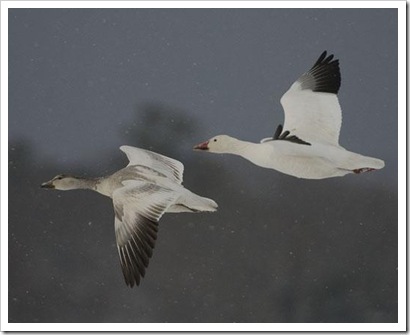 Flying Snow by Tony Pratt
Flying Snow by Tony Pratt
Snow Geese
by Mary Oliver, from Why I Wake Early
Oh, to love what is lovely, and will not last!
What a task
to ask
of anything, or anyone,
yet it is ours,
and not by the century or the year, but by the hours.
One fall day I heard
above me, and above the sting of the wind, a sound
I did not know, and my look shot upward; it was
a flock of snow geese, winging it
faster than the ones we usually see,
and, being the color of snow, catching the sun
so they were, in part at least, golden. I
held my breath
as we do
sometimes
to stop time
when something wonderful
has touched us
as with a match,
which is lit, and bright,
but does not hurt
in the common way,
but delightfully,
as if delight
were the most serious thing
you ever felt.
The geese
flew on,
I have never seen them again.
Maybe I will, someday, somewhere.
Maybe I won't.
It doesn't matter.
What matters
is that, when I saw them,
I saw them
as through the veil, secretly, joyfully, clearly.
Posted by
Daron
at
7:20 PM
![]()
Labels: impermanence, Mary Oliver, nature, paying attention, photography, poetry, time
I am dead because I lack desire,
I lack desire because I think I possess.
I think I possess because I do not try to give.
In trying to give, you see that you have nothing;
Seeing that you have nothing, you try to give of yourself;
Trying to give of yourself, you see that you are nothing:
Seeing that you are nothing, you desire to become;
In desiring to become, you begin to live.
A Contemporary Spin on the Tao Te Ching
by Ron Hogan
#28
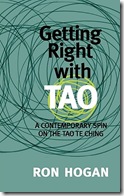 If you are strong,
If you are strong,
but remain sensitive,
power will flow through you.
With that power,
you'll always be right with Tao:
It's like a whole new life.
If you are idealistic,
but stay rooted in reality,
you are an example to others.
Set that example,
and you'll always be right with Tao:
There is no limit to what you can do.
If you are honorable,
but remain humble,
you will see things as they are.
If you see things as they are,
you'll always be right with Tao:
Your life will become simple,
yet full of potential.
Let Tao show you
how to get right with Tao,
so your slightest gesture
can change the world.
* * * * *
#16
Keep your head clear.
Stay calm.
Watch as everything happens around you.
Everything reverts to its original state,
which was nothing.
And when something becomes nothing,
it gets right with Tao.
If you don't understand that,
you're going to screw up somewhere down the line.
If you figure it out, you'll always know what to do.
If you get right with Tao,
you won't be afraid to die,
because you know you will.
Posted by
Daron
at
3:10 PM
![]()
Labels: flow, Lao Tzu, paying attention, reality, Ron Hogan, Tao Te Ching, wisdom
…or just look at this pole and try to relax the impulse to define it or interpret it or decide whether or not it is beautiful. Try to notice what it feels like to see, as if you had no words for any of the forms or colors in front of you, as if the words on the paper were written in a language you never learned to read.
…or let your gaze spread gently across your entire field of vision, taking in the area immediately in front of you, the farthest distance you can observe without straining, the right and left edges of your peripheral vision, and everything in between. Take it all in at once—the whole three-dimensional volume of visual space. This is what the present looks like. This is what it feels like to see without spinning a story. This is what it feels like to see as a young child sees, simply fascinated with the seeing itself. Sixty seconds can feel like a long time. Try stringing together several intervals of four or five seconds instead.
…or listen to what this moment sounds like without needing to know the source of the sounds or to evaluate any of them as pleasant or unpleasant. Steep in the wonder of vibrations striking tiny bones inside your ears and massaging that space where all of the internal chatter plays out, wave after wave of internal sound. There’s no need to tamp down the internal sounds that well up as you’re listening. Allow them to play out as they will, trying to be aware of the silence between the waves. Use the activity of internal sound to remind you to spread your listening out in all directions and become absorbed by it.
Posted by
Daron
at
6:10 PM
![]()
Labels: attention, breath, hearing, mindfulness, paying attention, practice, present, seeing
Excerpts from Question Your Thinking, Change The World: Quotations from Byron Katie:
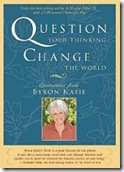 We’re often quite sure about what other people need to do, how they should live, and whom they should be with. We have 20/20 vision about others, but not about ourselves. When you do The Work, you see who you are by seeing who you think other people are. Eventually you come to see that everything outside you is a reflection of your own thinking. You are the storyteller, the projector of all stories, and the world is the projected image of your thoughts.
We’re often quite sure about what other people need to do, how they should live, and whom they should be with. We have 20/20 vision about others, but not about ourselves. When you do The Work, you see who you are by seeing who you think other people are. Eventually you come to see that everything outside you is a reflection of your own thinking. You are the storyteller, the projector of all stories, and the world is the projected image of your thoughts.
* * * * *
We only fear what we are—what we haven’t gone inside and taken a look at and met with understanding. If I think you might see me as boring, it would frighten me, because I haven’t investigated that thought. So it’s not people who frighten me, it’s me that frightens me. That’s my job, until I investigate and stop this fear for myself. The worst that can happen is that I think you think about me what I think about myself. So I am sitting in a pool of me.
* * * * *
I like to ask, “Are you breathing yourself?” No? Well, maybe you’re not thinking yourself or making decisions either. Maybe it doesn’t move until it moves, like a breath, like the wind. And you tell the story of how you are doing it, so you can keep yourself from the awareness that you are nature, flowing perfectly. Who would you be without the story that you need to make a decision?
* * * * *
No one has ever been able to control their thinking, although people may tell the story of how they have. I don’t let go of my thoughts—I meet them with understanding, then they let go of me.
* * * * *
The ego is terrified of the truth. And the truth is that the ego doesn’t exist.
Posted by
Daron
at
9:58 PM
![]()
Labels: Byron Katie, ego, fear, identity, inquiry, self, self/other, story, storytelling, thinking
“The next time you pass by a jewelry shop window displaying a beautifully cut, teardrop-shaped stone, don’t be so sure it’s just your culture telling you that that sparkling jewel is beautiful. Your distant ancestors loved that shape and found beauty in the skill needed to make it—even before they could put their love into words.”
~ Denis Dutton, author of The Art Instinct: Beauty, Pleasure, and Human Evolution
Posted by
Daron
at
9:29 PM
![]()
Labels: aesthetics, Andrew Park, animation, art, beauty, Charles Darwin, Denis Dutton, evolution, language, TED
 "If you ask people to imagine winning the lottery, they typically talk about the things they would do — ‘I’d go to Italy, I’d buy a boat, I’d lay on the beach’ — and they rarely mention the things they would think. But our data suggest that the location of the body is much less important than the location of the mind, and that the former has surprisingly little influence on the latter. The heart goes where the head takes it, and neither cares much about the whereabouts of the feet.”
"If you ask people to imagine winning the lottery, they typically talk about the things they would do — ‘I’d go to Italy, I’d buy a boat, I’d lay on the beach’ — and they rarely mention the things they would think. But our data suggest that the location of the body is much less important than the location of the mind, and that the former has surprisingly little influence on the latter. The heart goes where the head takes it, and neither cares much about the whereabouts of the feet.”
~ Dan Gilbert, from "When the Mind Wanders, Happiness Also Strays," by John Tierney, New York Times, November 15, 2010
Participate in this research by using your iPhone to track your happiness.
Excerpt from Tinkers by Paul Harding:
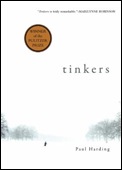 Your cold mornings are filled with the heartache about the fact that although we are not at ease in this world, it is all we have, that it is ours but that it is full of strife, so that all we can call our own is strife; but even that is better than nothing at all, isn’t it? And as you split frost-laced wood with numb hands, rejoice that your uncertainty is God’s will and His grace toward you and that that is beautiful, and part of a greater certainty, as your own father always said in his sermons and to you at home. And as the ax bites into the wood, be comforted in the fact that the ache in your heart and the confusion in your soul means that you are still alive, still human, and still open to the beauty of the world, even though you have done nothing to deserve it. And when you resent the ache in your heart, remember: You will be dead and buried soon enough.
Your cold mornings are filled with the heartache about the fact that although we are not at ease in this world, it is all we have, that it is ours but that it is full of strife, so that all we can call our own is strife; but even that is better than nothing at all, isn’t it? And as you split frost-laced wood with numb hands, rejoice that your uncertainty is God’s will and His grace toward you and that that is beautiful, and part of a greater certainty, as your own father always said in his sermons and to you at home. And as the ax bites into the wood, be comforted in the fact that the ache in your heart and the confusion in your soul means that you are still alive, still human, and still open to the beauty of the world, even though you have done nothing to deserve it. And when you resent the ache in your heart, remember: You will be dead and buried soon enough.
Howard resented the ache in his heart. He resented that it was there every morning when he woke up, that it remained at least until he had dressed and had some hot coffee, if not until he had taken stock of the goods in his brush cart, and fed and hitched Prince Edward, if not until his rounds were done, if not until he fell asleep that night, and if his dreams were not tormented by it. He resented equally the ache and the resentment itself. He resented his resentment because it was a sign of his own limitations of spirit and humility, no matter that he understood that such was each man’s burden. He resented the ache because it was uninvited, seemed imposed, a sentence, and, despite the encouragement he gave himself each morning, it baffled him because it was there whether the day was good or bad, whether he witnessed major kindness or minor transgression, suffered sourceless grief or spontaneous joy.
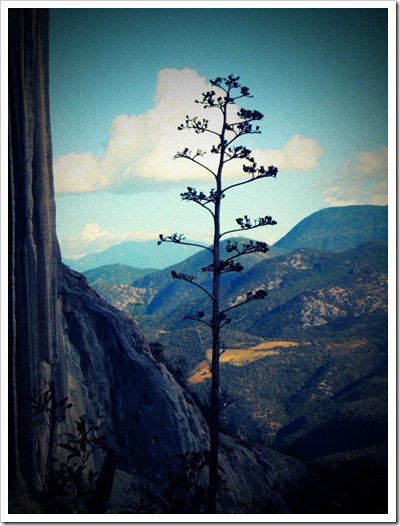
Sweet Darkness
by David Whyte
You must learn one thing.
The world was made to be free in.
Give up all the other worlds
except the one to which you belong.
Sometimes it takes darkness and the sweet
confinement of your aloneness
to learn
anything or anyone
that does not bring you alive
is too small for you.
Posted by
Daron
at
10:56 PM
![]()
Labels: David Whyte, freedom, life, loneliness, Oaxaca, photography, poetry
Shinzen Young, from “A Meeting with a Pioneering Meditation Teacher,” with Tami Simon, Sounds True’s Insight at the Edge (November 2, 2010):
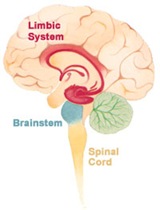 “Neuroscientists are aware that there is a system in the brain that they call the limbic system; it’s sometimes called the emotional brain. What I’ve attempted to do is create certain focusing exercises that will allow a person to be able to detect when their limbic system activates. So, then, well how do you go about doing this? Well, I can give you a tangible example.
“Neuroscientists are aware that there is a system in the brain that they call the limbic system; it’s sometimes called the emotional brain. What I’ve attempted to do is create certain focusing exercises that will allow a person to be able to detect when their limbic system activates. So, then, well how do you go about doing this? Well, I can give you a tangible example.
Let’s say you’re listening to music and, as you listen to music, you are monitoring how your body is reacting to the music. Your body may smile if you like the music, but then at some point if there’s something you don’t like about the music, you get some other kind of sensation reaction in your body.
Or, you can listen to people talking, listen to people you agree with—politicians, philosophers, religious leaders—listen to them and then notice the impact on your body. Then, listen to people you disagree with—religious leaders, political leaders, philosophers—who have the opposite of your beliefs, then watch what happens in the body. Pay attention to that.
By monitoring your body’s reactions to sounds, especially human speech sounds or music, and then by monitoring your body’s reaction to external visual impressions, with time you can develop a sensitivity to detect the locations and flavors of sensation that are emotional in nature. It’s a training and it takes a while, but if you’re willing to do it, your whole body becomes like this high resolution emotional radar screen. So, as soon as there’s an impact from the physical world, you’re aware if there’s any emotional juice, however subtle—subtle is significant. If there is, you’re able to detect it and open up to it. If there’s not, you’re also aware of that fact.
So, by doing exercises in that way, eventually you learn to detect the subtle emotional reactions that we’re constantly having in the body that are triggered by other events. And, that’s how you go about doing it.”
Posted by
Daron
at
1:40 PM
![]()
Labels: feelings, listening, mindfulness, music, neuroscience, paying attention, Shinzen Young, Sounds True
“There is no right language or wrong language any more than there are right or wrong clothes. Context, convention, and circumstance are all.”

The Dream of Now
by William Stafford
When you wake to the dream of now
from night and its other dream,
you carry day out of the dark
like a flame.
When spring comes north, and flowers
unfold from earth and its even sleep,
you lift summer on with your breath
lest it be lost ever so deep.
Your life you live by the light you find
and follow it on as well as you can,
carrying through darkness wherever you go
your one little fire that will start again.
Posted by
Daron
at
4:36 PM
![]()
Labels: dreams, Oaxaca, photography, poetry, present, seasons, waking up, William Stafford
"Politics is the art of looking for trouble, finding it, misdiagnosing it and then misapplying the wrong remedies."
~ Groucho Marx
Remordimiento Por Cualquier Muerte
de Jorge Luis Borges, from Poems of the Night
Libre de la memoria y de la esperanza,
ilimitado, abstracto, casi futuro,
el muerto no es un muerto: es la muerte.
Como el Díos de los místicos
de Quien deben negarse todos los predicados,
el muerto ubicuamente ajeno
no es sino la perdición y ausencia del mundo.
Todo se lo robamos,
no le dejamos ni un color ni una sílaba:
aquí está el patio que ya no comparten sus ojos,
allí la acera donde acechó su esperanza.
Aun lo que pensamos
podría estar pensándolo él;
nos hemos repartido como ladrones
el caudal de las noches y de los días.
Remorse for Any Death
translated by W.S. Merwin
Free of memory and hope,
unlimited, abstract, almost future,
the dead body is not somebody: It is death.
Like the God of the mystics,
whom they insist has no attributes,
the dead person is no one everywhere,
is nothing but the loss and absence of the world.
We rob it of everything,
we do not leave it one color, one syllable:
Here is the yard which its eyes no longer take up,
there is the sidewalk where it waylaid its hope.
It might even be thinking
what we are thinking.
We have divided among us, like thieves,
the treasure of nights and days.
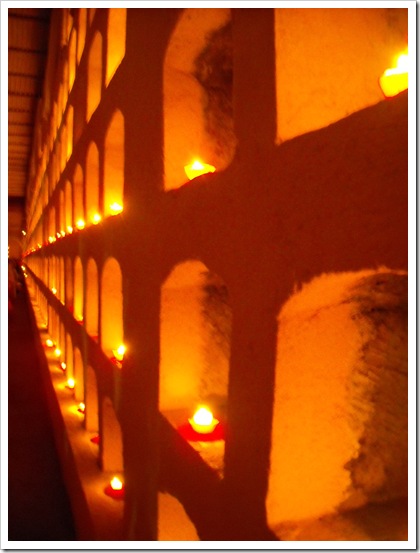
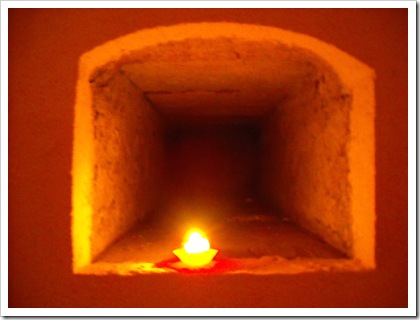
Posted by
Daron
at
7:51 PM
![]()
Labels: Day of the Dead, death, Halloween, identity, Jorge Luis Borges, Oaxaca, photography, poetry

Para hablar con los muertos
de Jorge Teiller
Para hablar con los muertos
hay que elegir palabras
que ellos reconozcan tan fácilmente
como sus manos
reconocían el pelaje de sus perros en la oscuridad.
Palabras claras y tranquilas
como el agua del torrente domesticada en la copa
o las sillas ordenadas por la madre
después que se han ido los invitados.
Palabras que la noche acoja
como a los fuegos fatuos los pantanos.
Para hablar con los muertos
hay que saber esperar:
ellos son miedosos
como los primeros pasos de un niño.
Pero si tenemos paciencia
un día nos responderán
con una hoja de álamo atrapada por un espejo roto,
con una llama de súbito reanimada en la chimenea,
con un regreso oscuro de pájaros
frente a la mirada de una muchacha
que aguarda inmóvil en el umbral.
In Order to Talk with the Dead
In order to talk to the dead
you have to choose words
that they recognize as easily
as their hands
recognized the fur of their dogs in the dark.
Words clear and calm
as water of the torrent tamed in the wineglass
or chairs the mother puts in order
after the guests have left.
Words that night shelters
as marshes do their ghostly fires
In order to talk to the dead
you have to know how to wait:
they are fearful
like the first steps of a child.
But if we are patient
one day they will answer us
with a poplar leaf trapped in a broken mirror,
with a flame that suddenly revives in the fireplace,
with a dark return of birds
before the glance of a girl
who waits motionless on the threshold.
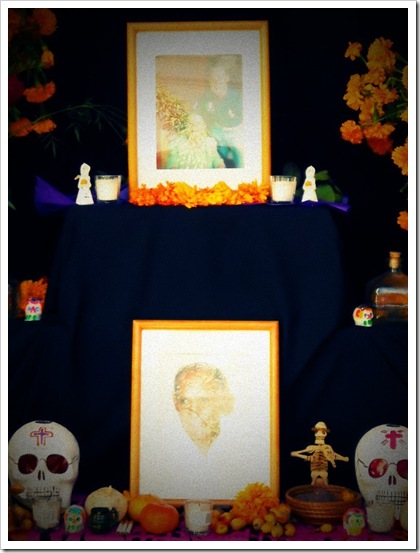

Posted by
Daron
at
9:22 AM
![]()
Labels: Day of the Dead, Halloween, Jorge Teillier, language, Oaxaca, photography, poetry, travel, waiting
Visiting the Graveyard
by Mary Oliver, from Red Bird
When I think of death
it is a bright enough city,
and every year more faces there
are familiar
but not a single one
notices me,
though I long for it,
and when they talk together,
which they do
very quietly,
it's an unknowable language—
I can catch the tone
but understand not a single word—
and when I open my eyes
there's the mysterious field, the beautiful trees.
There are the stones.
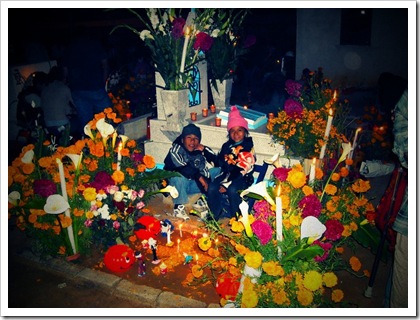
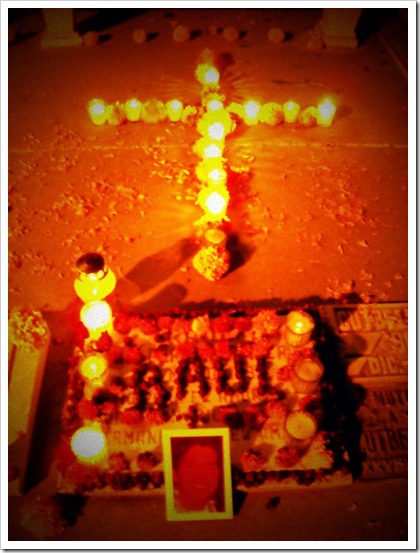

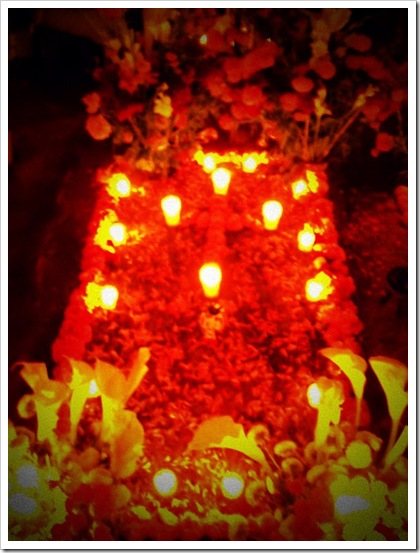
Posted by
Daron
at
11:55 PM
![]()
Labels: Day of the Dead, death, Halloween, language, Mary Oliver, Oaxaca, photography, poetry, travel

Picnic, Lightning
by Billy Collins
It is possible to be struck by a
meteor or a single-engine plane while
reading in a chair at home. Pedestrians
are flattened by safes falling from
rooftops mostly within the panels of
the comics, but still, we know it is
possible, as well as the flash of
summer lightning, the thermos toppling
over, spilling out on the grass.
And we know the message can be
delivered from within. The heart, no
valentine, decides to quit after
lunch, the power shut off like a
switch, or a tiny dark ship is
unmoored into the flow of the body's
rivers, the brain a monastery,
defenseless on the shore. This is
what I think about when I shovel
compost into a wheelbarrow, and when
I fill the long flower boxes, then
press into rows the limp roots of red
impatiens — the instant hand of Death
always ready to burst forth from the
sleeve of his voluminous cloak. Then
the soil is full of marvels, bits of
leaf like flakes off a fresco,
red-brown pine needles, a beetle quick
to burrow back under the loam. Then
the wheelbarrow is a wilder blue, the
clouds a brighter white, and all I
hear is the rasp of the steel edge
against a round stone, the small
plants singing with lifted faces, and
the click of the sundial as one hour
sweeps into the next.
Daron Larson
Freelance Contemplative
